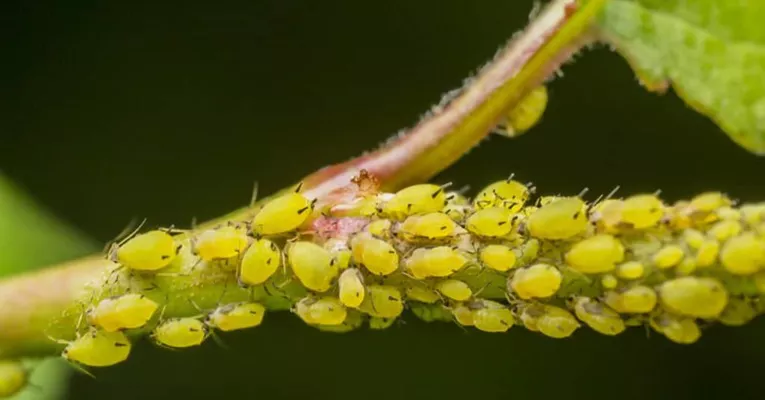Aphids are a common problem for rose growers. These tiny insects suck the sap from rose plants, weakening them and causing distorted leaves, poor flower production, and the spread of diseases. If left unchecked, aphids can multiply quickly and damage your roses. Fortunately, there are several effective methods to get rid of them and prevent future infestations.
What Are Aphids?
Aphids are small, soft-bodied insects that come in various colors, including green, black, yellow, pink, and brown. They are usually found in clusters on the undersides of leaves and along the stems of roses. Aphids feed by piercing plant tissues and extracting sap, which weakens the plant and causes the leaves to curl and yellow. Some aphid species also produce a sticky substance called honeydew, which can attract ants and lead to sooty mold.
Signs of an Aphid Infestation
If you suspect aphids on your roses, look for these signs:
- Clusters of small insects on new growth, stems, and the undersides of leaves
- Distorted, curled, or yellowing leaves
- Sticky honeydew on leaves and stems
- Sooty mold (a black fungal growth) on leaves
- Decreased flower production or deformed blooms
How to Get Rid of Aphids on Roses
There are several ways to control aphids on roses. Depending on the severity of the infestation, you may need to use a combination of methods.
1. Remove Aphids by Hand
For small infestations, you can simply remove aphids by hand:
- Wear gloves and gently wipe aphids off the leaves and stems.
- Use a strong stream of water from a hose to dislodge aphids.
- Prune heavily infested leaves and stems and dispose of them properly.
2. Use Natural Predators
Beneficial insects help control aphid populations naturally:
- Ladybugs feed on aphids and can be introduced into your garden.
- Lacewings are another natural predator that consumes large numbers of aphids.
- Parasitic wasps lay their eggs inside aphids, killing them over time.
Encourage these beneficial insects by planting flowers such as daisies, marigolds, and dill, which attract them to your garden.
3. Apply Insecticidal Soap
Insecticidal soap is an effective and safe way to kill aphids:
- Choose a commercial insecticidal soap or make your own by mixing a few drops of mild dish soap with water.
- Spray the soap solution directly on aphids, making sure to cover the undersides of leaves.
- Repeat every few days as needed.
4. Use Neem Oil
Neem oil is a natural pesticide that disrupts aphids’ growth and feeding:
- Mix neem oil with water and a small amount of dish soap.
- Spray the solution on affected areas.
- Apply in the early morning or late evening to avoid harming beneficial insects.
5. Try Homemade Remedies
There are several DIY sprays that can help eliminate aphids:
- Garlic Spray: Blend garlic with water, strain the mixture, and spray it on roses.
- Pepper Spray: Mix hot pepper flakes with water, strain, and apply to infested areas.
- Tomato Leaf Spray: Soak chopped tomato leaves in water overnight, strain, and spray on aphids.
6. Use Companion Planting
Some plants naturally repel aphids:
- Chives, onions, and garlic deter aphids with their strong scent.
- Marigolds and nasturtiums attract aphids away from roses.
- Lavender and rosemary act as natural repellents.
7. Introduce Diatomaceous Earth
Diatomaceous earth is a fine powder that damages aphids’ outer shells:
- Dust a light layer on rose plants.
- Reapply after rain or watering.
8. Use Chemical Insecticides as a Last Resort
If natural methods fail, you can use chemical insecticides:
- Select a product labeled for aphid control on roses.
- Apply according to the instructions to avoid harming beneficial insects.
- Avoid using insecticides during peak pollinator activity times.
How to Prevent Aphid Infestations
Once you have removed aphids, take steps to prevent them from returning:
- Inspect Roses Regularly: Check plants for aphids and remove them before they multiply.
- Encourage Beneficial Insects: Maintain a garden environment that supports natural predators.
- Keep Plants Healthy: Water and fertilize properly to help roses resist pests.
- Use Row Covers: Lightweight fabric can protect young plants from aphids.
- Apply Mulch: Organic mulch helps create a habitat for beneficial insects.
Conclusion
Aphids can be a serious problem for rose growers, but they can be controlled with the right strategies. Using a combination of manual removal, natural predators, organic sprays, and preventive measures can keep your roses healthy and aphid-free. Regular monitoring and early intervention are key to preventing severe infestations.
Related Topics:


